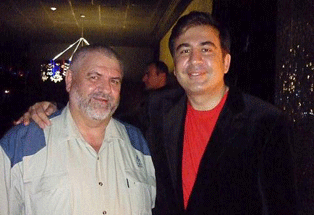“What do we need Boers for?! What is their Advantage?!” – States Georgian Farmer
Zaza Tsuladze, radio Voice of America
On January 24th the Boers visited Georgia again. The visit will continue on until the January 29th. On February 7 - 21st, two more groups of Boers are to arrive for four days. There are two professors of agriculture among the delegation – Koos de la Rey and Ben Stender.They will help the government with carrying out the agricultural reform.
The aim of both delegations will be acquainting with the investment potential of Georgian agricultural sector that will help Boers to make historic decision: whether or not they shall leave South Africa for making business in Georgia. Since the New Year’s, Georgian government has activated an internet site South African Farmers in Georgia www.boers.ge. The project manager Juba Maruashvili stated to Voice of America:
“At the initial stage, things are not like some marginal media sources broadcast. Right now there is usual pre-investment process at the preparatory level. I cannot say anything concrete at this moment.”
It has been the third month that several farmers with Ben Van Zyl in charge have been living in Georgia. Van Zyl is a chief manager of African Agricultural Union. Papuna Davitaia, State Minister in diaspora issues made a memorandum of mutual understanding with the corresponding union. The full text of memorandum is still confidential. The only thing that is known is that Georgian government offers Boers to transfer business from Africa to Europe. The first delegation of Boers visited Georgia in September of last year. They had meetings with President, several Ministers and the first lady Sandra Ruloves. One more group of Africans arrived on January 13th. State Minister in diaspora issues Papuna Davitaia states: “We are talking about the successful Dutch, British and French farmers. They can provide many employment opportunities and create rather large segment of economics that will enhance our budget. These people are seeking ways of diversification for the business. They are seeking ways to approach European and Asian market and it would be good if they transfer their agriculture to Georgia.”
The special internet site of government is giving chance to Boer farmers willing to move to Georgia to address President of Georgia in online regime for obtaining Georgian citizenship. The applicant needs to answer 36 questions for application. Government wants to know whether the applicant is going to transfer his business to Georgia; what are the annual business circulation and income like; how many family members are planning to move and whether they need government’s help with the land selection.
According to the South African press, about 60 Boer farmers have decided to move to Georgia or rule their business from South Africa. For now, only one Boer has a Georgian passport – William Sternberg De Klerk who lives in Bolnisi and works in the company Madneuli. How many Boers addressed Georgian President for obtaining Georgian citizenship or whether or not they made this request at all is not known. The only thing known is the impressions of Boer’s last visit published in the form of 15-page letter. Here are several interesting quotes: “70% of food is imported in Georgia today. Government wants to reduce this number to 30% for next five years. There are people in Georgia who are getting a lot of money from this import. They are not going to be happy if we produce sufficient food and destroy their markets. Our farmers have an opportunity to do business in another continent in far more secure environment. There is a potential of creating successful agricultural farming in different segments of agriculture. We are given chance to buy 80 hectare land. The lands in state ownership are available in all ten regions of the state.”
The most interesting issue is the land alienation to Boers. On the website http://www.boers.ge./index-2.html there are maps published reflecting the lands offered to Boers. But after many citizens discovered their land on the maps, they got taken out of the site. Many experts think it is suspicious that the Office of Prosecutor started studying the legality of already privatized land with more than two hectares.
According to non-official information, more than hundred private persons, by the pressure of the Office of Prosecutor “gifted” land affirmed by the Land Legalization Commission back to the state. That is why part of public and opposition parties is suspicious about accommodating Boers, including farmer Aleks Tsintsadze: “If government gives us land and techniques under lease, an opportunity to work and preferential loans, we can work as well. We are going to create collective brigade and a cooperative. All this needs a lot of money and if government gives us loans and stands by us what do we need Boers for?! What is their advantage?! We love our country and would love to work!”
Boers are the ancestors of people exiled to Africa from the Netherlands in the 17th century. Boer means peasant in Dutch language, in the native language of Boers it is equivalent to farmer. The boom of Boer farmers started after the WWII when they were taking large subsidies for developing agricultural farming. This situation lasted till the end of 1994 before the fall of apartheid in South Africa. Then the opposite process started – black people started oppressing Boers. For the last seventeen years more than three thousand Boers have been killed on the racial grounds. Because of this part of Boer farmers dispersed in 22 states. It shall be noted that the first contact of Boers with Georgians occurred during the second English-Boer war when Georgian aristocrat Niko Bagration-Mukhranski (Niko Boer) left for Africa in 1899 to help Boers.




